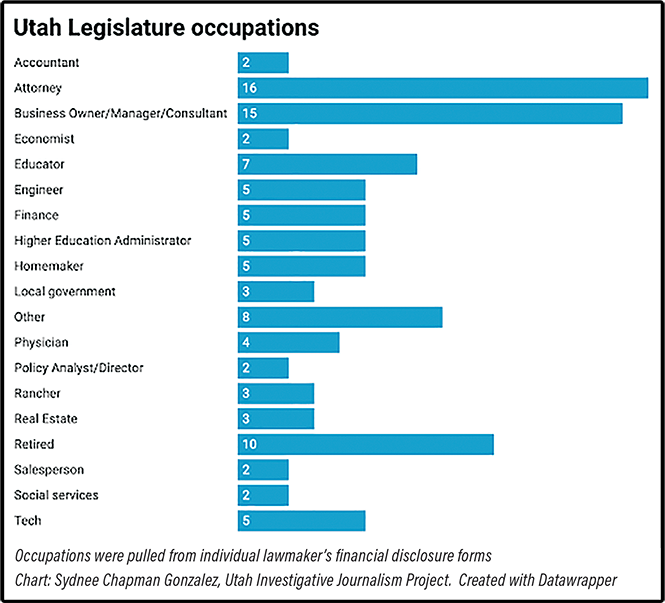The Secret Sauce
How Utah lawmakers disclose—or don't disclose—conflicts of interest.
By Sydnee Chapman Gonzalez and Eric S. Peterson @ericspetersonThe following story was reported by The Utah Investigative Journalism Project in partnership with Salt Lake City Weekly.
The Utah Legislature is made up of part-timers whose day jobs shape their approach to lawmaking. In many cases, their expertise as doctors, educators, business owners and more offers insight into a myriad of issues affecting Utahns. But lawmakers' professional interests can also open the door for conflicts of interest.
Take the fact that 40% of House members and 51% of senators are involved in real estate, though few list it as their primary occupation. How does this impact their approach to eviction or affordable housing? And what other, perhaps more niche, conflicts of interest could impact the public?
Some, but by no means all, of the answers are in lawmakers' financial and conflict of interest disclosure forms. Each member is required by state law to file these self-reporting forms that cover their and their spouse's past and current employers, holdings and investments, businesses and real estate holdings that they believe may be a conflict of interest.
In an ideal world, the forms would give critical insight into how lawmakers make their money. But a Utah Investigative Journalism Project review of lawmakers' 2024 disclosure forms found that many use vague language to describe their employment or business ventures, making it difficult to identify possible conflicts.
For example, the form asks lawmakers to report individuals or entities from which they received at least $5,000 in income. Many lawmakers did not include their employers or businesses in that category or left it blank. Other lawmakers disclosed that they provide consulting but did not specify to what businesses or industries.
Elected officials should be as upfront as possible about their finances, said David Cuillier, director of the Brechner Freedom of Information Project at the University of Florida. Privacy regarding personal finances, he added, is something elected officials sacrifice when they choose to run for office.
"Those sorts of things, we should know that, otherwise we're going to have a really corrupt government—even more corrupt than what people suspect," he said. "Every penny should be reported. We should know what they're up to because they're our servants, we've elected them to do the public's job. If they're being influenced by certain forces for money, then we should know that."
Some lawmakers left out certain investments and businesses from the form entirely. The Utah Investigative Journalism Project used public records to identify 30 active businesses that lawmakers did not report disclosures. Those undisclosed businesses are spread across 13 Utah lawmakers.
Workin' It
Reps. Phil Lyman, R-Blanding; Kera Birkeland, R-Morgan; Ken Ivory, R-West Valley; Val Peterson, R-Orem; and Sen. Jerry Stevenson, R-Layton, all had one undisclosed business each. Rep Stewart Barlow, R-Fruit Heights, had two. Those lawmakers did not respond to a request for comment.
Sen. Don Ipson, R-St. George, had 10 undisclosed corporate entities, but in an email said they were set up years ago by his lawyer and accidentally renewed with the state. Reps. Bridger Bolinder, R-Grantsville, and Dan Johnson, R-Logan, also each had an undisclosed entity, but when contacted about them, both said the entities weren't active, they had forgotten to include them and have since updated the forms.
Sen. Evan Vickers, R-Cedar City, responded that he did not disclose three entities since they were no longer functional, though they are still listed with the state. Rep. Keven Stratton, R-Orem, and Sen. Heidi Balderree, R-Lehi, also each had an undisclosed entity they mistakenly left off their forms, which have since been updated.
House Speaker Mike Schultz, R-Hooper, had four real-estate-related entities left off his disclosure, including for apartments and land investments. After being asked about the entities, he also updated his disclosure form. In a statement from the Legislature, it was explained that the oversight was because he "no longer oversees the day-to-day operations."
Many lawmakers disclose holding companies but don't disclose what real estate those companies might own. Some holding companies are also controlling members of other companies that were not disclosed. Sen. Mike McKell, R-Spanish Fork, has a Sockeye Holdings that is a member of Black Canvas. He declined to say what the company did but said it wasn't functioning and didn't hold any assets.
Lyman's Recapture Investment Group is also a member of the Roughstock Group, which is involved in real estate activities, according to state paperwork.
Some lawmakers, however, opted to be more specific when filling out their disclosures, such as including a long list of their volunteer positions or items that are not specifically required.
St. George Republican Rep. Neil Walter, for example, disclosed that his family's ranch is currently involved in a lawsuit with the state over water rights; Sen. Karen Kwan, D-West Valley, disclosed that her home sits along the Jordan River; and Sen. Keith Grover, R-Provo, listed a number of crypto investments as well as several real estate LLCs, mostly in Hawaii and Paraguay.
"Well you have to disclose that, because then invariably we might get a crypto bill, right?" Grover said. "I don't mind being abundantly clear."
Day Jobs
A review of lawmakers' professions showed over 30 different types of private work among lawmakers. The most common job among lawmakers is attorney, with 16 of the state's 104 lawmakers—or 15%—listing attorney as their primary occupation. The second most common occupation is business owner/manager/consultants at 14%, followed by retired individuals at 10% and educators (teachers and professors) at 7%.
Other more common occupations included higher education administrator, tech jobs, homemaker, engineer and physician. Less common professions included accountant, advocate, nurse, police officer and office manager. A comparison of lawmakers' legislative bios and their disclosure forms found that some appeared to cherry-pick parts of their profession to promote publicly and on the Legislature's website.
Schultz, the House speaker, has highlighted his agriculture background, including work at a young age on his grandfather's cattle farm and operating a family ranch in Croydon. Schultz's disclosure form confirms that he does indeed own a ranch—but he also owns several businesses, ranging from real estate and aviation to contracting and finance lending. Schultz told KUTV 2 reporters last year that he has been pulling out of real estate due to conflicts.
Morgan Rep. Kera Birkeland lists herself as a private preschool teacher in her legislative bio, but neither her current disclosure nor the disclosure she filed when she was appointed to the House in 2020 listed her doing preschool teaching. More recently, Birkeland worked as a business manager for the Durbano Group, a law and real estate development firm—a position left out of her LinkedIn and legislative bio but included in her disclosure form. She currently owns a churro food truck and a marketing firm, works for the medical spa SkinFX and as a high school football and basketball referee, according to her disclosure form.
Rep. Trevor Lee, R-Layton, lists his profession as "wealth manager" on the legislative website, but his disclosure form lists Home Depot as his current employer. That is left out of his LinkedIn, but both his LinkedIn and disclosure form highlight Lee Financial Consulting—which he described as "insurance, sales trusts, wealth management, annuities and hard money loans."
Lee's disclosure did not include Lee Financial Consulting as an entity he had received at least $5,000 from in income, but it did include insurance commissions from Midland National, which Lee clarified was income he made through Lee Financial Consulting. He said his employment with Home Depot was left out of his LinkedIn and bio because he hadn't updated them.
Sen. Daniel Thatcher, R-West Valley, lists his profession as an independent electronics and low voltage wiring contractor. However, he lists senator as his current employment on his disclosure form and does not list any income. The only other disclosure Thatcher included was his status as president for iTeam-USA, a nonprofit focusing on career and technical education. Thatcher did not respond to a request for comment.
Forms and Function
These exclusions and vague descriptions don't automatically signal a lawmaker is up to no good. But they may indicate a need for more specific requirements, according to Gabe Roth, executive director of Fix the Court, which pushes for more court transparency. He suggested lowering the reporting threshold for the investments and income and requiring exact dollar amounts.
The state elections office reviews legislator disclosures for completeness and timeliness. But Utah does not conduct full audits on the disclosure, unlike many other states, according to a review by the Center for Public Integrity.
Justin Kirkland, a University of Virginia professor who researches state legislature transparency, said a thorough audit of conflicts can make lawmakers more detailed in their disclosures. He cautioned, however, that disclosures and other transparency initiatives have limited ability to encourage accountability and can have unintended consequences, like discouraging those with certain expertise from seeking office
"The public is generally not paying great attention to state-level politics," Kirkland said. "Media coverage of state politics has declined significantly in the 21st century and the thoroughness of these regimes varies pretty widely."
Cuillier argued that disclosures are still a vital tool despite pitfalls. "I still think that overall it's a valuable thing to do. It's just whether or not there are the resources and the will to act on it," he said.
More by Eric S. Peterson
-
Police departments in Salt Lake County spent almost $20 million on civil rights complaints in the past decade
The Co$t of Mi$conduct
- Oct 18, 2023
-
Women decry harassment and toxic culture at St. George auto dealership
Men at Work
- Oct 11, 2023
- More »
Latest in Cover Story
Readers also liked…
-
Forget the family pedigree—Robert F. Kennedy Jr should not be the next president of the United States
Trojan Horse
- Jun 21, 2023
-
Women decry harassment and toxic culture at St. George auto dealership
Men at Work
- Oct 11, 2023






